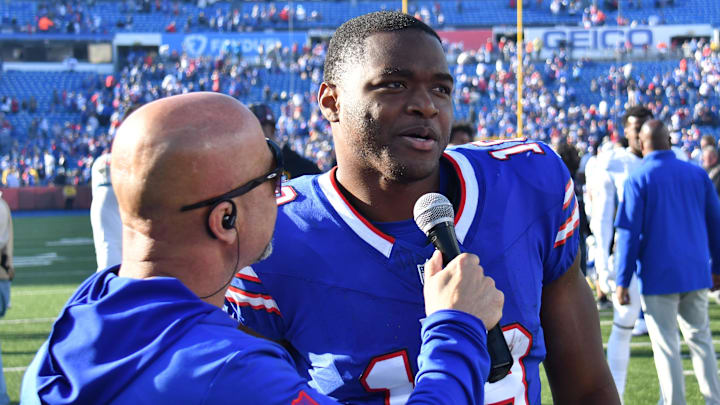Doesn't Jerry Jones' all-in promise feel like a lifetime ago? While Dallas Cowboys fans took Jones' vow, for lack of a better term, with a grain of salt, it offered some hope that the front office would be more aggressive in the offseason than it had been in previous years.
It quickly became clear, though, that Jones' definition of "all-in" meant signing Dak Prescott and CeeDee Lamb to extravagant extensions. As far as free agency is concerned, re-signing veteran cornerback Jourdan Lewis will go down as Dallas' most impactful move.
Incredibly, the Cowboys find themselves in a position similar to the 2018 season when they acquired Amari Cooper before the trade deadline. With the offense in a rut, folks hoped for a Cooper reunion but the wide-receiver-needy Buffalo Bills beat everyone to the punch.
There are alternative options for Dallas if they are in the market for a wide receiver, but the Cooper trade disentombed some awful memories for myriad reasons.
With Cooper on the move again Jerry Jones was asked about trading the Pro Bowler to Cleveland three years ago during his Tuesday appearance on 105.3 The Fan. Jones' rationalization, as you might expect, lacked any semblance of logic.
Cowboys owner Jerry Jones reflects on trading Amari Cooper
"We went for the dollars. When we traded Amari Cooper, we saved almost $20 million for our cap and the future," Jones said, via The Athletic. "We took a lesser draft pick to get that savings. When he made this move the other day, Cleveland went for more draft picks and less savings. It was very simple."
This is Jones' latest attempt to dodge accountability and make himself appear smarter than he actually is.
At the time of the trade, Cooper was two years (!) into a five-year, $100 million contract that the Cowboys gave him. Given his production and consistency, Cooper's $20 million salary was great value. In 56 games with Dallas, Cooper accumulated nearly 4,000 receiving yards and 27 touchdowns. You can argue he was underpaid as a Cowboy.
Trading Cooper was shortsighted for various reasons. On one hand, Jones and the front office completely misread the WR market, which has exploded. The game's top performers, including CeeDee Lamb, now make well over $30 million per year. A number of teams, including the rival Eagles, are paying two receivers north of $20 million annually.
It's not like the Cowboys did anything of note with Cooper's savings, either. Paying Michael Gallup was an abject disaster. Terence Steele's big-money extension has not aged well. Re-signing Donovan Wilson, who has the fifth-highest cap hit on the team, does not look savvy.
The Browns got more for a lesser version of Cooper -a third-round pick and seventh-round pick - than what the Cowboys got for prime Cooper - a fifth-round pick and sixth-round pick swap.
At the end of the day, Jones did not "take a lesser draft pick" for the cap savings. He took a lesser draft pick because Dallas planned to cut Cooper if they couldn't find a trade partner. That information got leaked before the trade. They shot themselves in the foot. It is not possible to botch a trade worse than that.
Jones' attempt to explain that Dallas got a solid return on investment is a direct slap in the face to Cowboys fans.
